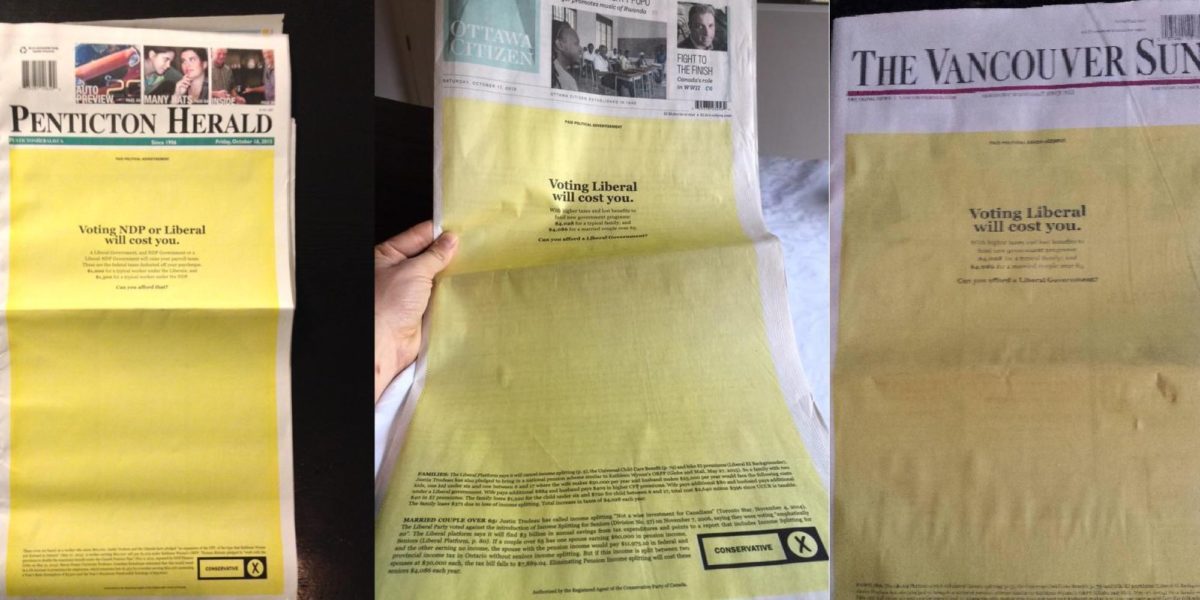

While the world outside of Canada was learning about the man with the hair, I spent the week trying to figure out what was happening in the industry I hope to break into one day.
Philip Lee, chair of the journalism department at St. Thomas, said banner ads, running along the top or bottom of the front page, are common.
“The front page has always been sacred news space,” said Lee. “I think that’s a pretty rare thing to sell the [entire] front page.”
In his experience, there have always been firm boundaries between news and advertisements. Often journalists don’t even know which ads are running when they lay out the paper.
Mark Tunney, journalism prof and former editor at the Telegraph-Journal, doesn’t see any problems with running campaign ads in general. Like any corporation they need revenue to stay in business. Ads provide this for media, campaign ads usually doubly so. However, he said lines were crossed when papers sold out their entire front page.
“It does take away a bit of integrity from the newspaper,” said Tunney. “It diminishes you in a little way. I mean maybe it’s just for that day, but I think that right now newspapers, if they’re going to stand for anything it’s got to be a little integrity in the storm of misinformation and bias information that swirls around us.”
***
With the financial aspect in mind, I went to Michael Camp who teaches media ethics. He said the ads would appall any serious journalist in the country. One of the main problems with the ads was trying to distinguish them from a creative editorial endorsement.
But Camp feels the ads are just one part of larger conflicts of interest the industry is facing. Journalism must be in public’s interest. The ads are “distressing examples of what happens when the private interests sometimes comes first.”
Elsewhere, the private interests of journalists have been leaking through their coverage and undermining their credibility, which Camp finds concerning. He says it’s up to the journalist to make sure they are balanced.
“I don’t know why this is happening now,” said Camp. “But I think it has something to do with the fact that the industry is so competitive, that we’re in a tough economy and I think decisions are being made that the same people wouldn’t have made 10 years ago.”
***
On Monday, Andrew Coyne resigned as editor of the Nation Post’s editorials (though he plans to stay on as a columnist). Coyne tweeted he’d had professional disagreement with executives when they refused to publish a column of his dissenting their endorsement of the Conservative party.
This only compounded my confusion of what lines were being crossed by news organizations. Have editorials just become pro-bono ads? Is it the distinctive right of a media-owner to portray their opinions to the public? Must journalists agree with them?
Lee feels keeping balanced coverage in a campaign is far more important than editorial stances. He found actual news coverage in this campaign to be pretty balanced.
“When I was in newspapers, I didn’t always agree with the editorials,” said Lee. “But that was the way it was and it certainly didn’t influence my news coverage.”
Lee doesn’t see a problem with owners voicing their opinions through editorials, so long as the reader can distinguish editorials, news and ads from one another.
Tunney said media in itself was changing. So much information is flowing, some is hard unbiased news and some is just advocacy. Both are equally able to provide a compelling story sometimes, whether they are balanced or not, but it can confuse readers.
“Sometimes we presume that people know that advertising is advertising, that news is news and that opinion is opinion,” said Tunney. “But people don’t. People mix that up and I think it might be fair to say the industry could do better to sort through that kind of stuff.”
Newspapers have always had some sense of partisanship according to Camp. He’s comfortable with editorials because it is preferable owners express themselves there than have opinion leak through news coverage. I should note that all three doubt endorsements effect the public opinion in an election anyways.
***
My conversations only confirmed the journalistic landscape is becoming more muddled, but that doesn’t mean the time of balanced and fair journalism is over.
Camp feels the industry has reached a crucial point where they need to step up and show journalistic ethics and integrity. He supports Coyne’s decision to step down and feels that he was well within his right to express a dissenting view from the paper without confusing readers.
“What message does that send to the readers?” asked Camp. “That ‘this is our position and everyone who works here has to feel the same way’? One of the signs of a good newspaper is the range of opinion that you see in it. Cause that says the leaders of that organization allow diversity, they’re not trying to squash points of view that they don’t like, and to me, that’s healthy and good.”
